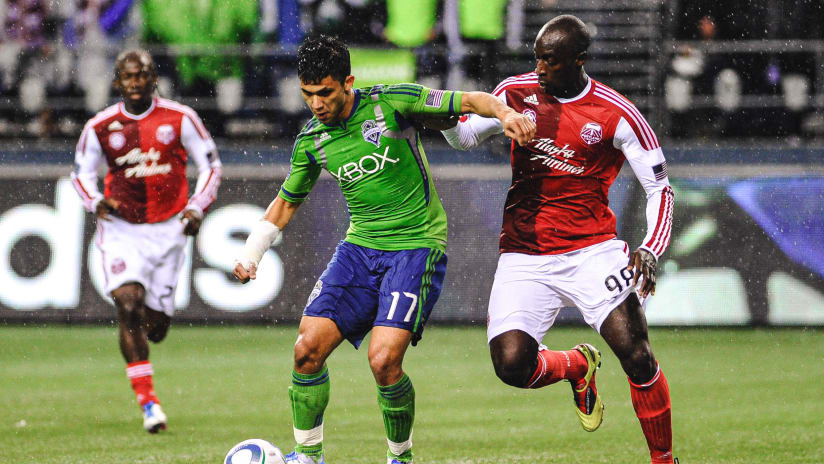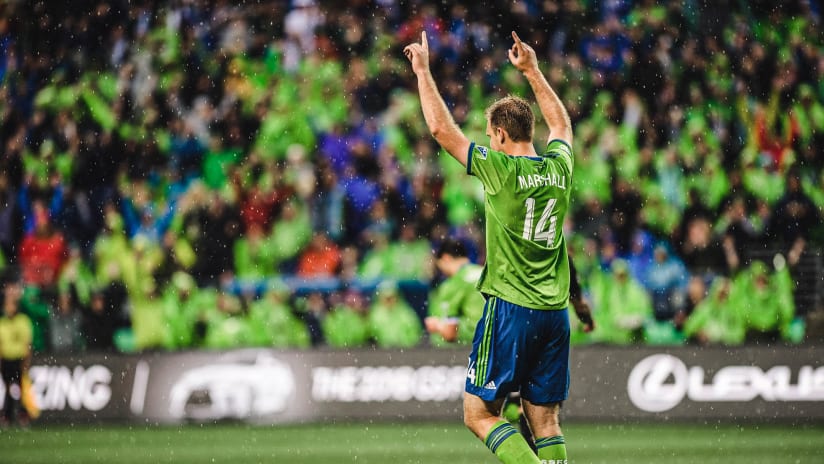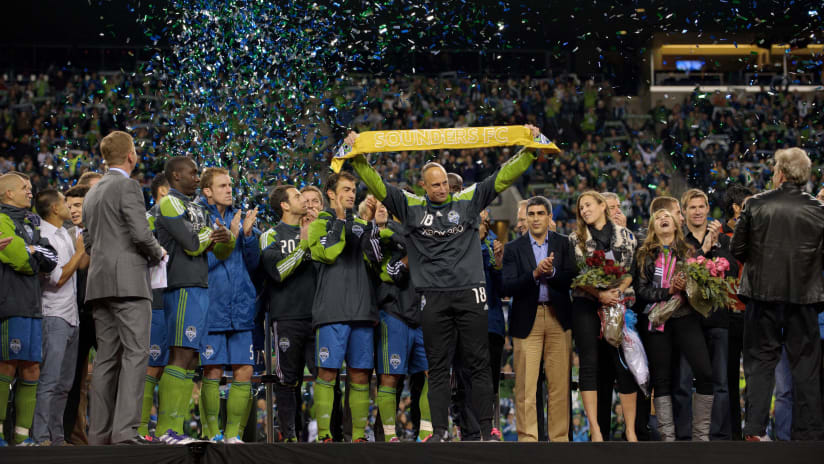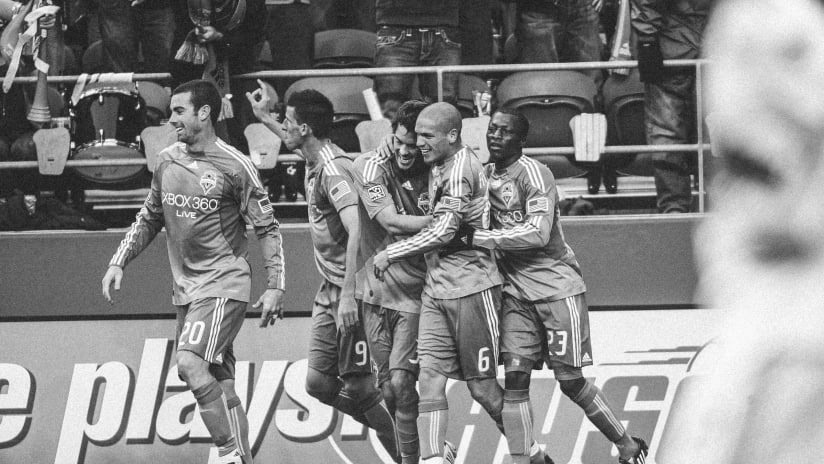Memories of Seattle Sounders FC’s first Major League Soccer meeting with the Portland Timbers remind us: some of a match’s most important stories take place beyond the field. Because for whatever spark the teams’ May 14, 2011, meeting gave their 36-year-old rivalry, much of the action within that day’s whistles was ultimately unremarkable. Two goals split just after halftime left the rivals drawn, 1-1.
The feelings around that game, though, have proven remarkable: in the anticipation that built in the years before; in the scenes in Seattle’s SoDo district around the match; in the relevance in the result that’d follow; in the legacy that game would help foster. MLS’s greatest rivalry may have begun decades before that 2011 kickoff, but with its arrival to U.S. Soccer’s top division, that rivalry was poised to change the league’s course.
From eight of the people who played key roles nine years ago, here are their memories of the MLS’s first Seattle versus Portland.
MLS’s (not so) new rivalry
By the time the Timbers debuted in Major League Soccer, most Sounders had experienced the teams’ rivalry. The sides had met in the 2009 U.S. Open Cup during the Sounders’ first MLS season, with the rivals drawn into a rematch the next year as Seattle defended its Open Cup title.
On the other hand, most of the Timbers’ 2011 squad were experiencing the dynamic for the first time, leaving the squads with different views on a rivalry “renewed.”
Roger Levesque, forward/midfielder, Sounders: “I knew all about the rivalry [laughs], having lived it since 2003. That was the first time I played the Portland Timbers in the USL era. I hated them. That was a feeling that was instilled in me not only by years and years of playing in the rivalry, but also teammates, coaches – Schmetzer being one of the main factors – and fans.”
Sal Zizzo, winger/fullback, Timbers: “I didn’t know much about [the rivalry], but it was one of the first things you hear about when you get traded to one of those two teams, so I was pretty interested. We had gone up there for preseason at their second-team stadium, Starfire, and we beat them.”
Jeremy Hall, midfielder/fullback, Timbers: “That’s when I really realized what that rivalry in the Pacific Northwest was about, playing in preseason. At Starfire, it’s small but that atmosphere, it was packed.”
Jack Jewsbury, midfielder/captain, Timbers: “You could tell – or I could, at least – in that first exchange, it was like, “Whoa. This is different.” People talked about it. People told me about it. But even in a preseason game at Starfire, you could get the sense that this was a true rivalry.”
Hall: “Seattle had all their fans, obviously. Timbers fans came out. We had a cool little section … There were some hurt Seattle fans, but our fans were so into it. They loved it.”
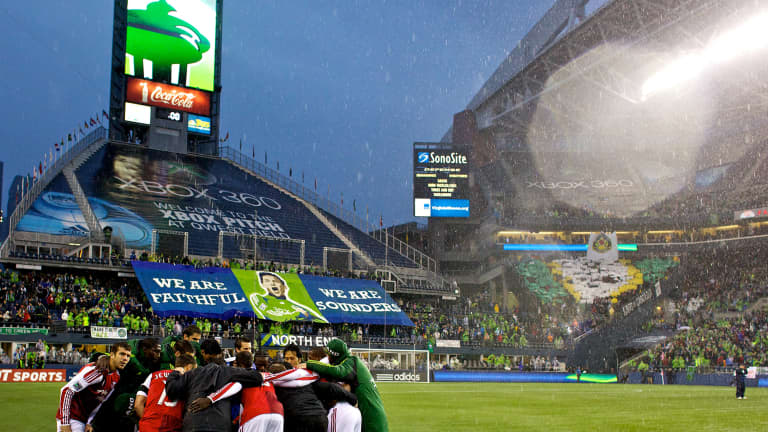
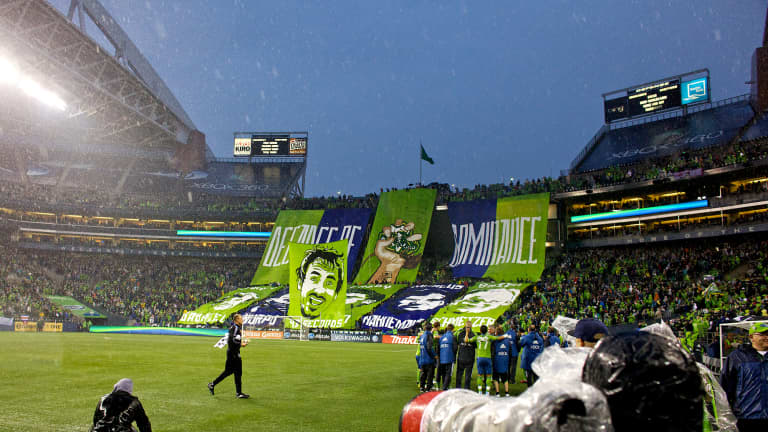
Eric Brunner, central defender, Timbers: “I’d had experience playing Seattle, so I understood the pitch [at CenturyLink Field] and understood how the crowd can be. With that all being said, I also understood it likely would be kicked up a notch knowing it was an important rivalry – especially with it being the first rivalry match in MLS.”
Brad Evans, midfielder, Sounders: “An important piece to this puzzle was having Schmetzer, Tommy [Dutra] and Frank McDonald on the staff. There were a lot of guys that kind of stoked this rivalry early on. The most important part was having the history and those guys building it up for us because I had never been a part of a true rivalry, and I didn’t really taste it until watching that Open Cup game the year before. It was a big deal.”
Brian Schmetzer, former assistant and current Head Coach, Sounders: “We wanted to win because it’s Portland. They had made a big deal of the [2009] U.S. Open Cup game, when Sanna Nyassi went down because somebody stepped on his finger, and it was the Roger Levesque [goal and tree chop celebration]. It was a big deal. So, the buildup to the first MLS version of the rivalry was certainly another talking point.”
Kasey Keller, goalkeeper, Sounders: “Because of those open U.S. Open Cup games in 2009 and 2010, I think everybody kind of knew what [the rivalry] was. It wasn’t something that just popped up because it was the first MLS match. Then to be able to turn that chapter, to the start of the MLS rivalry, and what it’s been able to become.”
Approaching the moment
Coming off playoff appearances in their first two seasons, Seattle experienced a slow start to their third, rebounding to a 3-3-4 mark after going winless in their first four matches. Like the Sounders, Portland had just recently brought their record in balance, winning four of their previous five after beginning 0-2-1.
Jewsbury: “[The week of the game] definitely felt different. There was a buzz in the locker room. There were more reporters than normal talking about it. Even in the city (Portland), you would hear conversations and things being discussed about the rivalry; people probably traveling for that game just to be part of history.”
Hall: “Seeing the fans marching; seeing them flip us off. You can see the, I don’t know if it’s hatred, but you can see the tenacity in their face, knowing they think their team was going to win just pumps you up … It gives you the mindset of, “I can’t wait to go out there and silence these people."
Zizzo: “From what I saw [from playing] at Hannover, going on the busses and road trips, soccer [in Germany] was sold out. It was life, over there. Coming back here, you didn’t get that sense. But when I got traded to Portland. The fans there and the rivalry with Seattle made it feel like I was back in Europe, playing those games … It was an interesting take on MLS.”
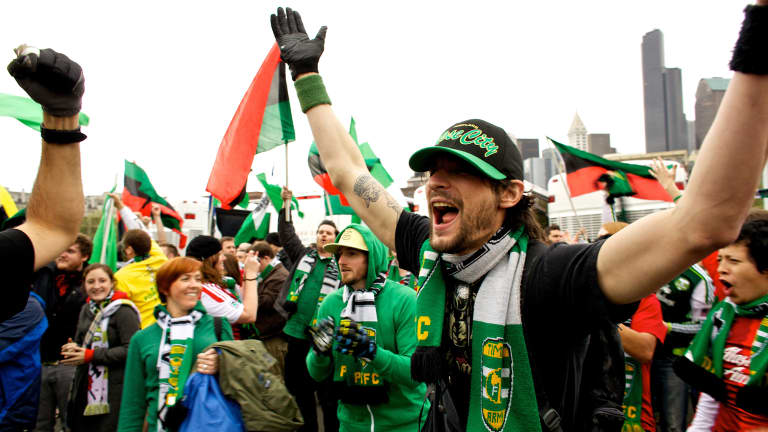
Evans: “To walk out during that game, with everyone standing, you just felt a different energy around that game. It was just an extremely special moment. It was a really good game to be a part of.”
Jewsbury: “I remember walking out that day for the starting lineups and just thinking “man, this is what you kind of dreamed of as a kid,” in terms of playing in big games and that feeling before, and the nerves and anxiousness, and all that stuff. Definitely a different feeling for those matches.”
Evans: “The buildup to this one was exactly the same: it was all about history. So, the pregame talks, pregame video were mostly about what was going on back in the day. Clips and highlights from brutal battles between Seattle and Portland. You could tell from minute one that this game had a special bite to it. A typical rainy night in Seattle, it was the perfect setting for this game.”
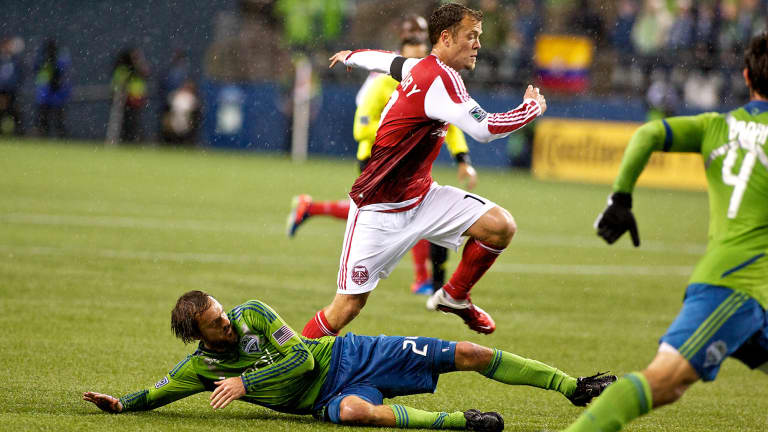
Levesque: “We knew the stakes were bigger because it was the first time we had played Portland in MLS. It was at home. We didn’t want to lose that game.”
Schmetzer: “Look, we were still the big dogs. We were already in MLS. We weren’t scared of them. It was a league game against our rivals that we wanted to win.”
The Next Chapter of the Rivalry
Although lacking in end product, the first half contained all the key ingredients of a derby match.
Both teams traded speculative shots from distance in the opening minutes before kicking into gear. The first half featured plenty of transition attacks as Seattle and Portland each pushed the pace of the match, punctuated by crunching tackles and dangerous set pieces.
Jewsbury: “We started the game really well, and you could feel us kind of growing in confidence. We had a couple of chances to go up in that first half that were not just half changes. They were real legit chances, whether they were on set pieces or in the run of play. For us, especially as a young expansion team, you could feel us grow into the game more and more.”
Evans: “Both teams had good possession of the ball and a couple of decent chances from both sides. Portland was a fast team. Sometimes teams come into CenturyLink and they sit back, but this game they came after us. It was a true rivalry game. So, that felt special.”
Hall: “[The Sounders] were really good back then. These guys were really smart: tactically; their rotations. I just remember going in there and going up against Alvaro Fernández, because I was playing right back. Technically, very good. Right, left foot. Smart player. Playing for Uruguay’s national team. And then you had Fredy Montero, who was a handful. Just kind of floating around. You’re constantly keeping an eye on him. Steve Zakuani was another big-time player.”
Jewsbury: “You could feel the intensity on the field. I don’t know if that’s just because of the fans in the stadium, but I remember there being a decent amount of challenges that you knew, “alright, this is different” … You could tell the guys were fueled off the history of these clubs. You could tell there was something more to the three points than normal.”
Schmetzer: “It was a hotly contested affair. They probably had way more buildup, something to prove, chip on their shoulder, than we did.”
After a scoreless first half, Seattle wasted little time breaking through in the second, scoring seven minutes in to give the Sounders their first MLS lead over Portland.
Evans: “Fredy Montero assist, Flaco smashes it home. Epic. Uses the wet turf. Just a great celebration all around and a really, really good goal. Crowd goes nuts, Flaco with his typical celebration. Feels like a celebration fitting of a rivalry game. Flaco has played in a number of those, coming from South America.”
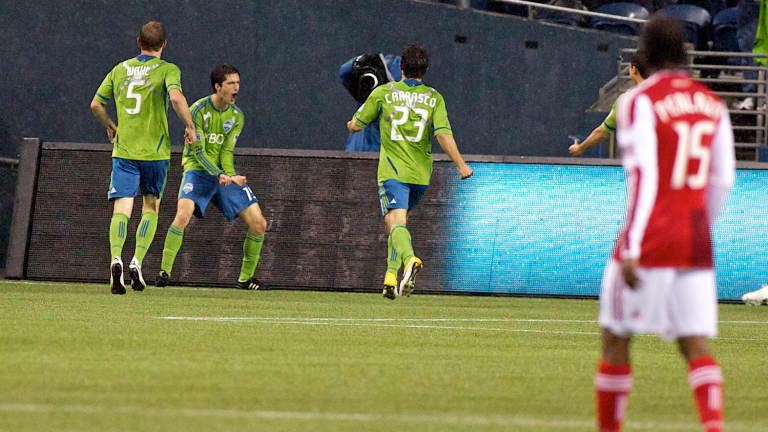
Brunner: “I don’t [remember Seattle’s goal], which is always a defender's mindset, but after rewatching a video of it – it looks like it was a miscommunication between myself and Jeremy, kind of a broken play that ended up falling for Fernández, and he slotted it in with a good finish.”
Levesque: “That [goal] sticks out in my mind because it was at the end of the field with ECS right there. I just have this distinct memory of the ball going in, and then a view of the Emerald City Supporters being as loud and boisterous as I’ve ever seen.”
Schmetzer: “Flaco scored a lot of big goals for us. He had some Champions League goals, he scored down in Mexico. They were in games that were significant. This certainly was a significant game because it was the first MLS meeting between the two clubs.”
Hall, on Fernández: “Just what a good player.”
Just after the hour mark, Portland made its first substitution, bringing on Zizzo for Darlington Nagbe. Three minutes later, the Timbers were on the scoresheet.
Zizzo: “I remember being on the right side, dribbling, getting the foul, us getting the ball … Jack hitting a nice ball, Futty [Danso] scoring. I remember him going to our fans on that far side of the field, just kind of cheering; all of us going nuts that we had tied the game.”
Keller: “It was just a good cross in the box. I think their big center back, Danso, got a little flick on it. Just disappointed that I couldn’t get there a little bit quicker, or that it just didn’t quite have that storybook finish to it.”
Jewsbury: “On set pieces, you can’t contain a guy like that. Obviously, his big stature, but he’s super strong, and he wants to get on the end of it. So for me, whether it was Futty or Dave Horst or Eric Brunner or [Steve] Purdy, Kenny Cooper – you list these names off, and these are some big bodies. For me, that whole season when I was taking set pieces, my goal was just to get it in a good spot for them … If I got it in a good spot, we knew we could be really, really dangerous in those moments.”
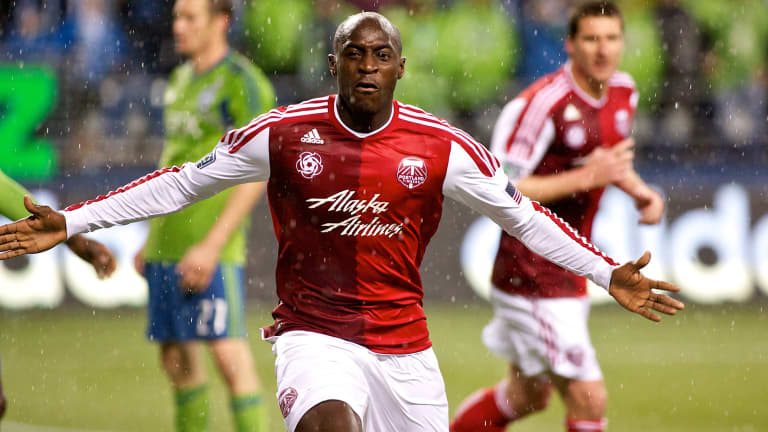
Brunner: “The atmosphere in Seattle is always active, but … I do remember hearing the TA the entire game, even for a limited [seating available] in CenturyLink. I remember when Futty scored, and it was almost a hush came over the entire CenturyLink, but hearing the TA going wild.”
Levesque: “I don’t [remember the goal], but I’m assuming it was off a set piece because he’s a big center back. Chalk it up to selective memory because in my mind we won that game 1-0 [laughs].”
Jewsbury: “You would think that when there’s 60-plus thousand in a stadium that [Timbers fans] would be drowned out by the noise of the Seattle fans. But it’s the complete opposite.”
Evans: “You look at Portland’s reaction up in that corner – you know they travelled with a couple thousand fans – and their reaction to that one you could tell it means so much to both clubs.”
What it meant in the moment
As the dust settled, one thing became immediately evident: the rivalry had entered a new, turbo-charged era. Fueled by its rich history, the first installment of the MLS iteration of the Seattle-Portland rivalry still possessed all the ingredients that had made it so compelling since the 1970’s. Ending in a 1-1 draw, it was a fitting result for two clubs that have spent the last decade fighting for supremacy in the Western Conference.
Evans: “I thought it was a bitterly tested battle. It was aggressive and fast. If this would’ve started out as a game where Portland came in and sat back and waited, it wouldn’t mean as much going forward. I think you saw from day one in MLS that that rivalry game was going to mean something.”
Jewsbury: “For a young team like us, going in there, coming out of a rivalry match with a point, it meant a lot. Obviously, we were a little bit disappointed. We would have loved to snag all three. But we felt good about the performance and where we were going at that point of the season.”
Levesque: “Thinking back on it now, it was probably just a little bit of relief that we didn’t lose. But also, hungry to get out and play them again.”
Zizzo: “That result, our fans wanted that. Seattle always thinks they’re the big brother. They had been established [in MLS] for a few years. We were still kind of getting all the kinks out from being an expansion team. To be able to go into Seattle and get a tie, our owners and the higher-ups were probably pretty happy about that.”
Evans: “It kind of set the stage and a baseline for where it could go. If it started as a nil-nil drab draw on national TV, it doesn’t mean as much. But the fact that both teams came in went after it, it stoked that little flame, and it’s only grown ever since.”
The legacy of the MLS era’s first round
Derbies between Seattle and Portland are now showcase events for MLS, becoming sought-after games for the league’s national broadcast partners. The clubs have also served as beacons for new and returning talents, from marquee signings (Obafemi Martins), future Most Valuable Players (Diego Valeri) and returning U.S. Men’s National Team icons (Clint Dempsey).
There have been new standards, too, both on the field and off. Between them, Seattle and Portland have claimed three stars, the West’s last five conference titles, and maintain home atmospheres that rank among the elite in Major League Soccer.
Evans: “This just went on to build and build throughout the years. It’s become this staple of Major League Soccer. If you ask any player that comes to this team or that team, this is the one they circle on the calendar. When the schedule comes out, this is the first game you look for. I don’t care if it’s your first week on the team, that’s just how it works. It’s immediately ingrained in this battle, and everyone that comes to the team will say this is by far the biggest rivalry in MLS.”
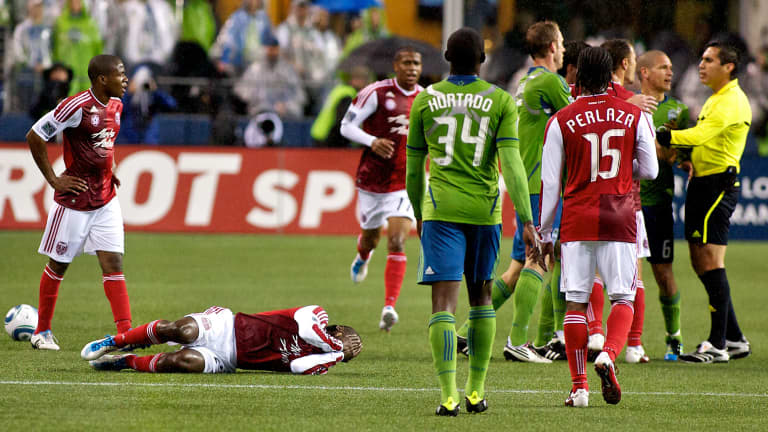
Brunner: “It’s one of my favorite experiences as a player. It was one of the first true rivalries in U.S. soccer, and to say I’ve been a part of several of those occasions is always humbling. The match is passionate and that starts with the passion of the fans, and that is felt through the locker room as we took that passion onto the field.”
Levesque: “The fact that it was the first game, it kicked off another level of the rivalry. Obviously, the rivalry dates back to the NASL days in the 70’s, continued through the USL. The bitter nature of it has been ingrained and has just grown. That moment didn’t disappoint. It just continues to grow. The fact that it was a draw just cements the idea that it’s always going to be a battle. It’s always going to be a grind. Sometimes the Sounders are going to end up on top, sometimes the Timbers. But you can’t take anything for granted in this rivalry.”
Hall: “For me, it really is the best rivalry, because the fans really don’t like each other. No matter where that game is, I feel like there’ll be fans for both teams there. But that lead up was awesome. We knew there was going to be a couple thousand of our fans there to support us. That week, there was a real excitement and an energy about that. Rain, shine, whatever it was, it was going to be packed … Battling against those guys, getting to score in that stadium: that was awesome.”
Zizzo: “You could say that Seattle was the first major team to be able to pull in that amount of fans. Obviously Atlanta and some of these teams followed, and then you’ve got Portland where the 18,000 fans that were there that first year, those games sounded like Seattle and however many fans they have at their stadium. Those games set the tone for the league.”
Keller: “There’s a reason why we’ve never had a local broadcast for this match because national TV takes it every time. Because of the atmosphere. Because of what the fans put together. There’s always a responsibility for the players. You know what it means to your fans, regardless of whether you’re a Sounders fan. Obviously, players come from all over the world and they have their club affiliations. But when you play in those big derby matches, you understand what it means for the fans, and you want them to be happy. You want them to go home excited, and there’s an extra pressure on that.”
Jewsbury: “There’s really nothing I can compare in my career to those days in the lead up to those matches … It’s just something that you never believe what’s happening; at least, I didn’t: from starting in the league in 2003 to seeing something like that from supporters of a club. For me, it really kind of blew my mind that there was this much passion around the sport of soccer in our country. I had never seen it, and there’s nothing like it in MLS.”
Schmetzer: “I think those seeds were sown long before. But what I would say is that it’s a significant game in the sense that it’s the first time that the two MLS teams met. But that rivalry was built back in the 70’s, 80’s, through the 90’s, up into the 2000’s, through the 2010’s and into the 2020’s. It’s going to continue to build. You can’t say that one game started it. The history is too long.”

